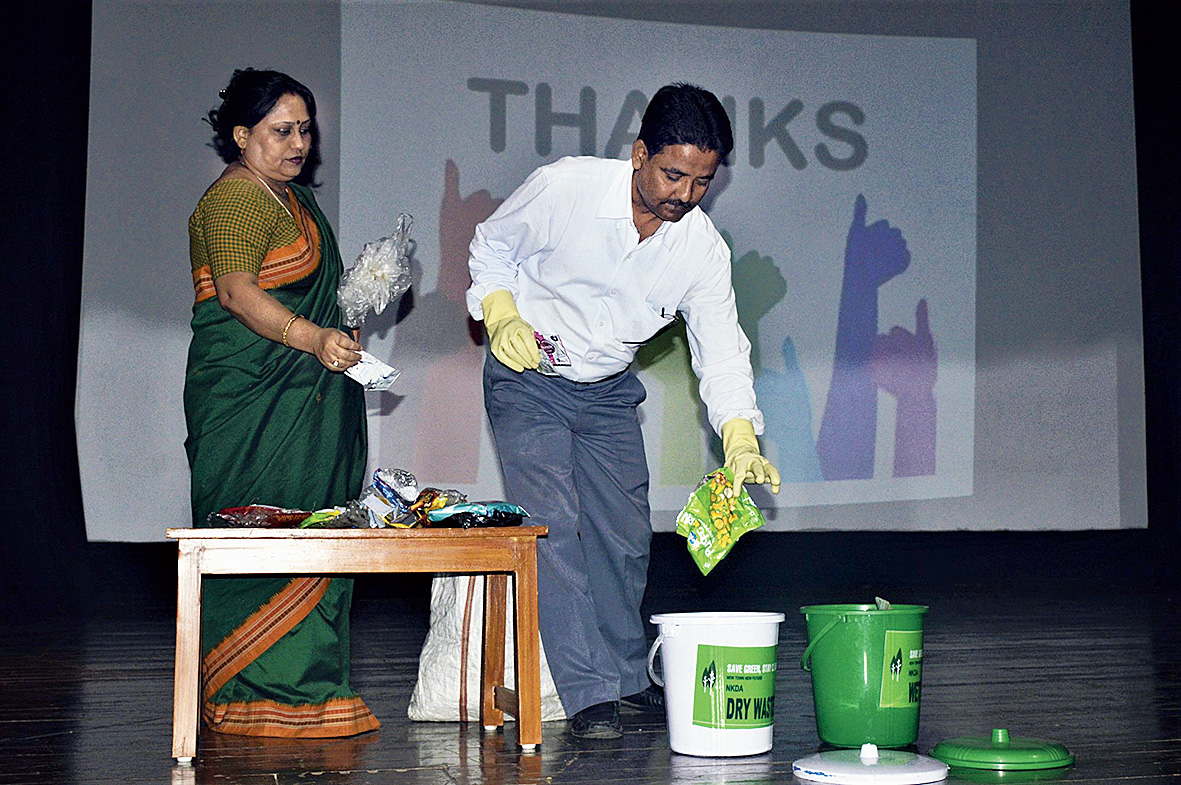New Town has kicked off an ambitious project of segregating its waste. It will reduce the volume of garbage being dumped at landfills, give a boost to recycling and produce compost that will serve as organic fertilisers.
But while New Town Kolkata Development Authority (NKDA) will be managing the back end, a huge onus lies on residents who will have to segregate their waste at home.
On March 1, NKDA held a sensitisation meeting cum workshop at Rabindra Tirtha and residents were quite upbeat about participating.
“Our landfill at Mollar Bheri behind Sector V is overflowing with garbage. It is polluting the environment and threatening to pour into the water bodies surrounding it,” said Debashis Sen, chairman of NKDA. “So we have decided to introduce waste segregation at source and aim towards a zero waste economy.”
Two dust bins
The process begins at home. “Households would need to maintain two dustbins — one for wet waste and the other for dry,” explained Sen (see box for details).
Wet waste being greater in volume and more likely to rot and smell, will be collected from households daily, as usual. The dry waste bin would contain items like paper, plastic and e-waste like batteries and residents would have to store them at home for a few days.
“Dry waste would be collected on Tuesdays and Saturdays. We shall send two separate garbage collectors on these days to collect wet and dry waste. This will prevent mixing,” Sen said.
The wet waste will be driven to Mollar Bheri to be processed by a soon-to-be-purchased composting machine. “We have to assess the volume of wet waste generated so we can buy a machine that can handle the corresponding quantity,” he explained.
New Town produces about 40 to 50 tonnes of waste a day but the dry waste would be deducted from this. “As per the municipal solid waste rule 2016, big housing complexes like Shapoorji Pallonji must manage their own waste so this amount will get deducted too. The remaining portion would be sent to the composting unit,” Sen said.
Compost has a market value but parties would be interested to buy it from NKDA only when a large quantity is produced. Till then, NKDA plans to use the fertiliser in Eco Park, Eco Urban Village and other parks and gardens.
The dry waste, on the other hand, will be sent to a 20 acre plot in Pathorghata behind Bagjola Canal. “The items sent here may be of no use to households but they have a resale value for those who deal with them. Paper, metal, plastic etc will be auctioned off to recyclers. E-waste will be sold to e-waste vendors,” said Sen.
Perils of dumping
The workshop at Rabindra Tirtha was attended by residents of AL, AK, AI, CA, CB, CC and CD and was conducted by Sanghamitra Mukherjee, a consultant in the field of waste management.
Mukherjee showed pictures of cows grazing at a dumping yard and horrified the audience by saying this could be where their breakfast milk came from. “Batteries, thermocol, plastics…this is what loitering cows are feeding out of,” said Mukherjee.
“And the stink at dumpyards is from rotting waste and toxic chemicals released from items dumped irresponsibly. Smelling them is inhaling them and one cannot stop chemicals from blowing to different parts of the city either. So the whole city is breathing in toxic fumes,” she explained. “The saddest part is that this is completely avoidable. It’s a man-made disaster.”
Mukherjee said that municipal waste, on an average, comprises 50 per cent organic materials, meaning half of what we throw can be cleansed out of the system.
The secret, she said, lies in the “3 Rs and 1 S”— reduce (use a jute bag instead of buying plastic bags afresh), reuse (use an old toothbrush to polish shoes), recycle (sell off old newspapers, plastic items) and segregate waste at source.
Students of Balaka Abasan’s Mrinalini School of Dance performed a street play asking the audience to be more conscious of the environment.
Residents upbeat
Residents of the area who attended the workshop are excited about being part of this novel initiative.
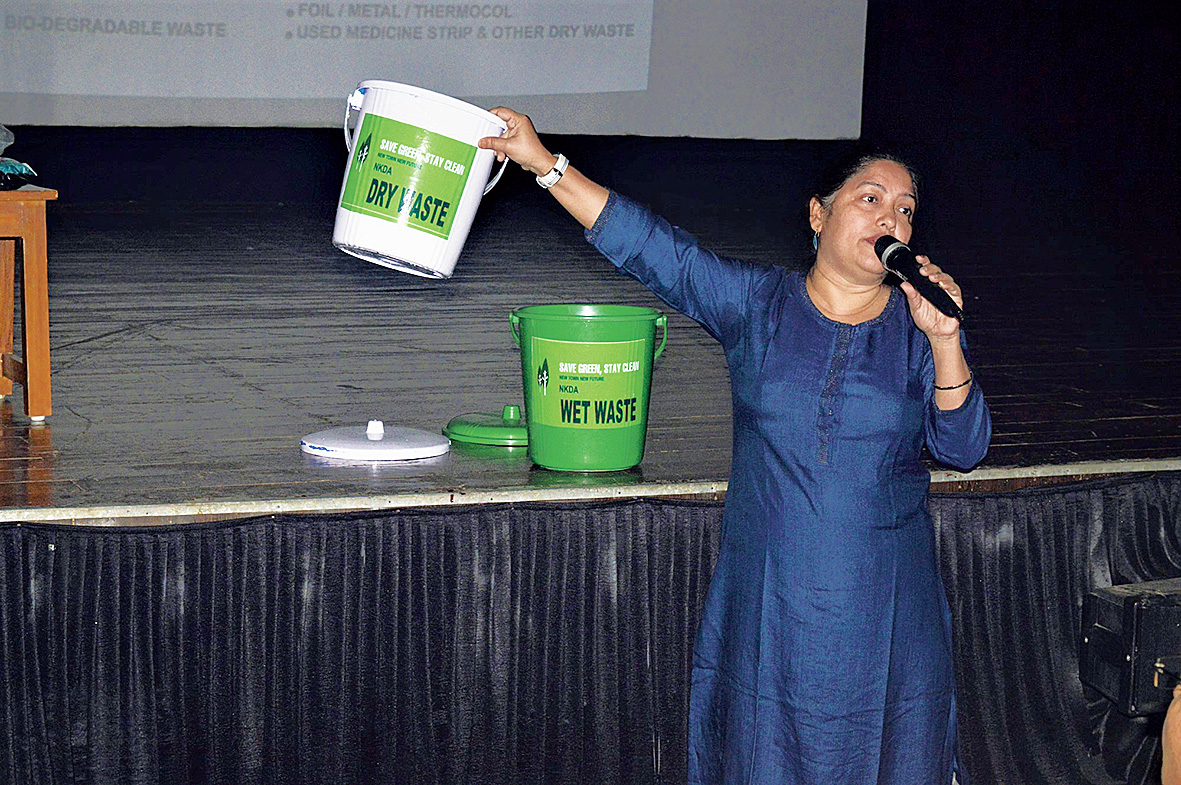
Sanghamitra Mukherjee explains the hazards of non-segregation. Debasmita Bhattacharjee
“Our work has increased marginally,” said CB Block’s Kakali Mukherjee after storing dry waste separately for a couple of days. “Instead of dumping the milk packet, we are now having to rinse it and keep it in a different basket for dry waste. It’s not asking for too much and I’ve taught the domestic help too.”
Greenthumbs like CD Block’s Sithi Kana Ghatak have been making compost on their own for years and are delighted that others will be doing the same now. “I’ve been advocating this for 15 years, ever since I lived in Salt Lake’s EB Block. There we had started segregating waste till neighbours lost steam. In New Town, things will be different since it’s being enforced by the administration,” she said.
Some co-operatives are taking time to implement the change. “Individual flats have started segregating but we have yet to buy a common bin for dry waste and place it downstairs. Till then, the wet and dry waste are going into the same bucket downstairs,” says Brajendra Kumar Santra of an AK Block co-operative.
Techno Nest, a co-operative in AK Block, is facing the same problem. “The very day after the workshop, we set off in search of a large drum to store the entire building’s dry waste downstairs, but in vain,” said Som Shekhar Datta of the co-operative. “We’ve searched malls and block markets alike but they all say they don’t stock 100 litre drums. The largest they have is 20 litre buckets.”
Datta and his neighbours have started segregating at home but are forced to dump everything together in the same bin downstairs. “We were hoping NKDA would provide us with drums,” he said.
Sen said NKDA would not be providing containers. “We understand there will be problems in the transition phase but people should work to overcome them,” said Sen. “In countries like South Korea, residents maintain up to six baskets for segregation but we are going with two to keep it simple; all the more since domestic help are involved.”
In case residents do not segregate their waste, the garbage men have been instructed to walk away without accepting the trash that day.
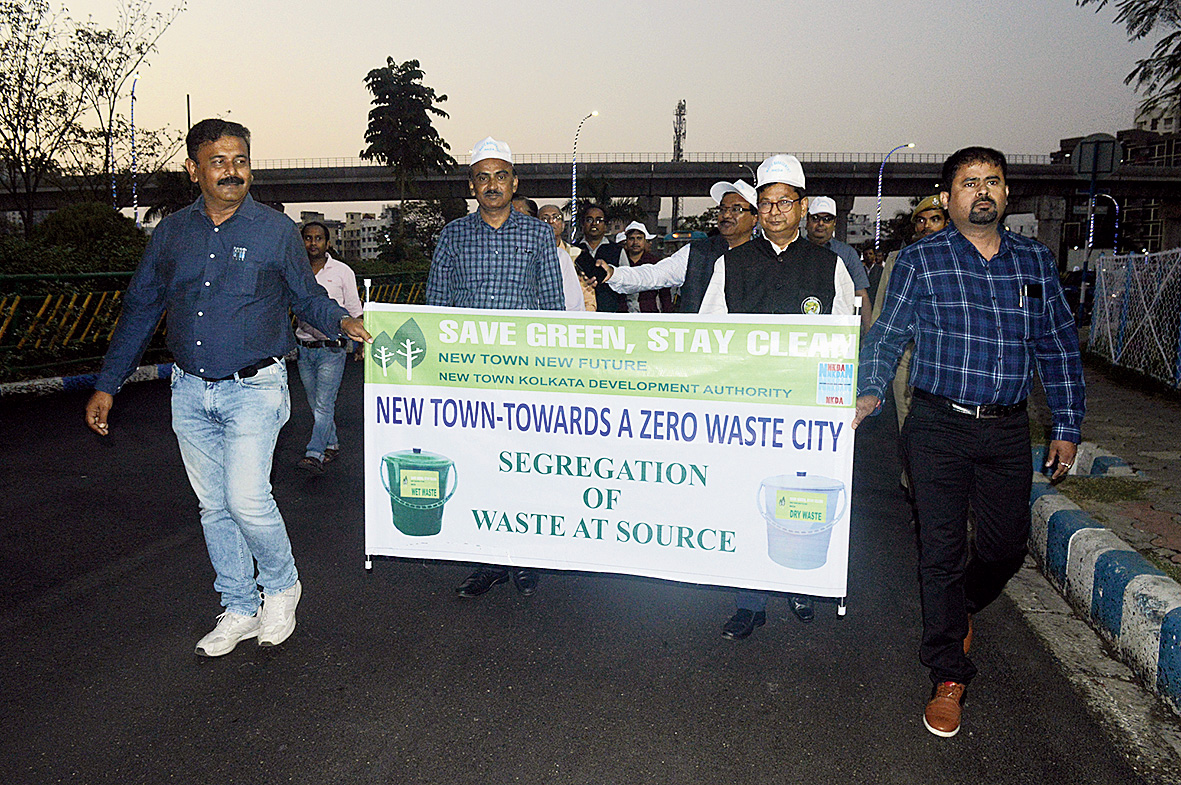
NKDA chief Debashis Sen leads residents in a walk to spread awareness on waste segregation. Debasmita Bhattacharjee
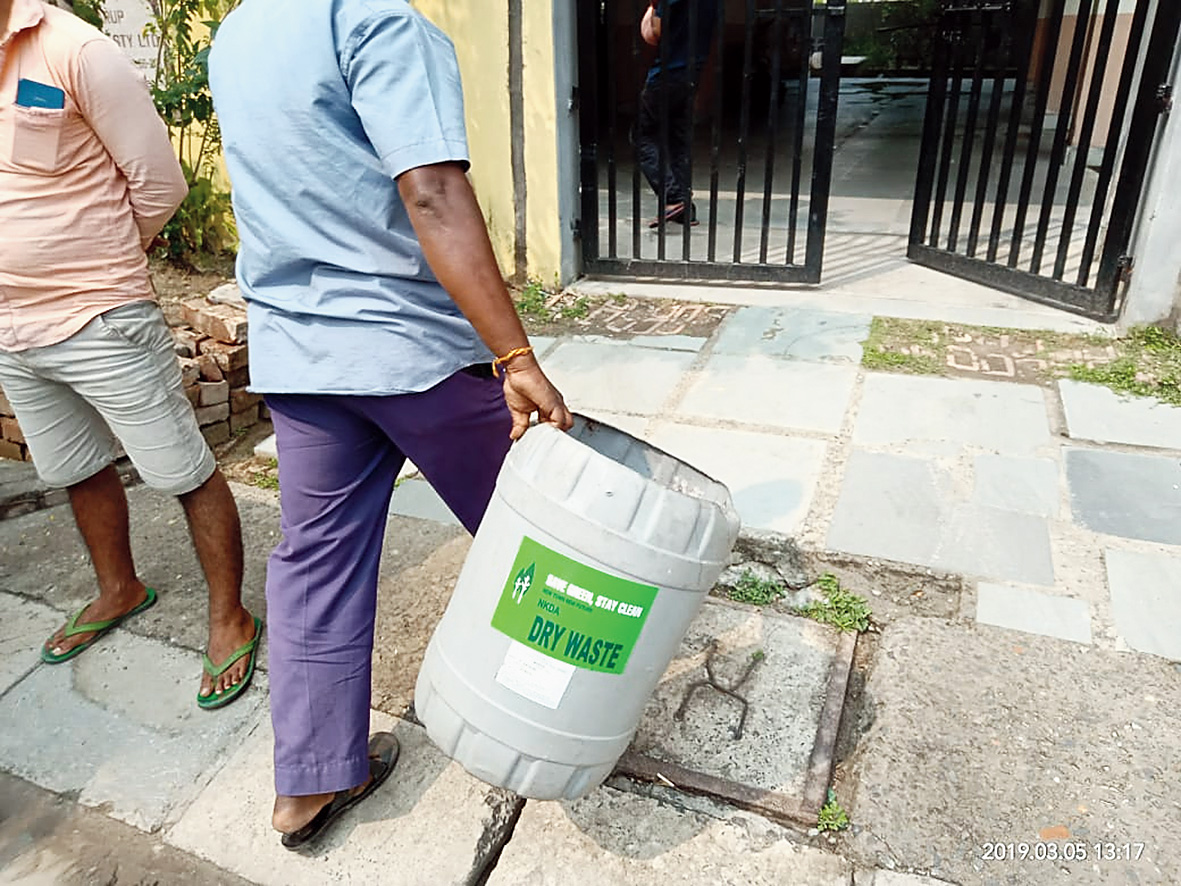
A garbage collector headed to pick up “dry waste”. Debasmita Bhattacharjee
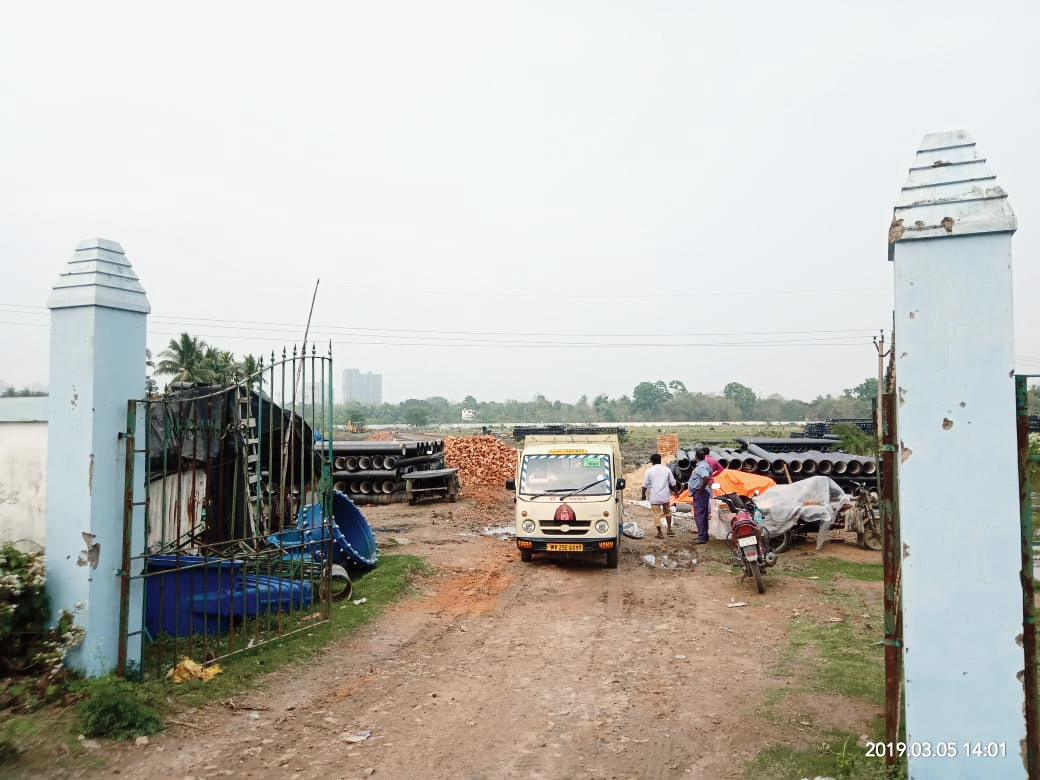
Collected dry waste being offloaded at the Pathorghata unit for resale. Debasmita Bhattacharjee
Do it yourself composting guide
Take an earthen pot and lay four inches of pre-composter. This you can make by mixing saw dust with coco peat, both available at the nursery.
Make a hole at the bottom of the pot and place it on a plate. Cover with an earthen lid. The porous nature of the container will allow moisture in.
Through the day, dump vegetable and fruit peels, fish scales etc. into the pot. But cut into small pieces before inserting.
Use a ladle to stir the contents now and then. Since you’re using an earthen pot, the mixture will not smell.
At night, put a layer of the pre-composter on the day’s collection and shut the lid. Repeat the process daily till the pot fills up. Thereafter keep it aside and start using a new pot.
Stir the original pot every two or three days to allow fresh air in. the compost will be ready in 30 days.
You may see the Black Soldier fly or larvae hovering around the pot. Do not panic. This fly only eats rotting food and will not touch your fresh food in the kitchen. The fly in fact helps the composting process and its droppings become vermicompost.

